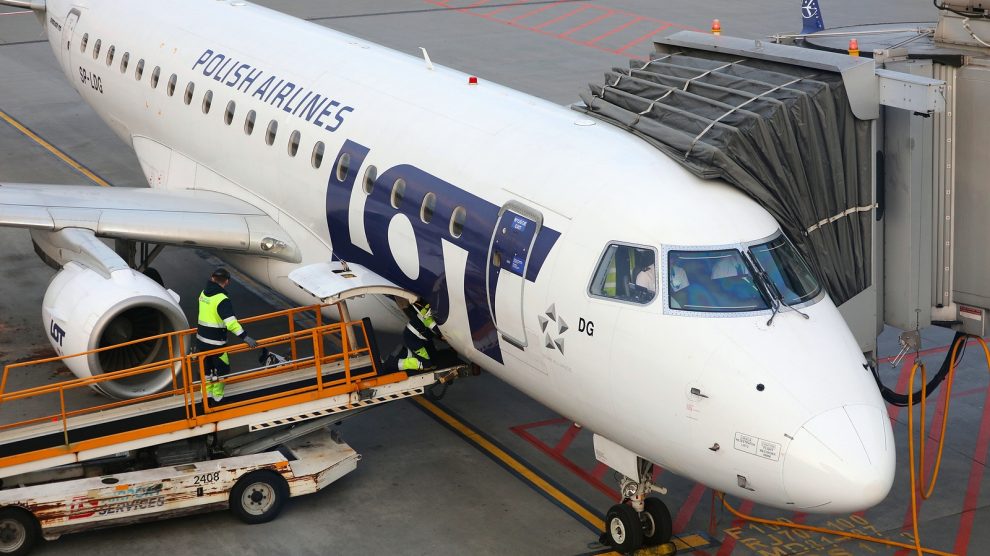Plans for a major new air and rail hub in central Poland face an uncertain future following Poland’s parliamentary election.
A flagship project of the Law and Justice party (PiS), which lost its majority in last month’s parliamentary elections, the future of Poland’s much vaunted Solidarity Transport Hub, known by its Polish acronym of CPK is far from certain.
The project has never enjoyed cross-party support, and the largest party in what is likely to be Poland’s new ruling coalition, Civic Platform, is currently sitting on the fence over the CPK’s future. The party’s election manifesto barely mentioned the CPK, merely promising to “review” the project.
- Poland votes for change, but making it happen will not be easy
- Economy in focus: Poland
- New Ionway investment cements Poland’s position as key EV battery hub
For the current Polish government—CPK’s largest shareholder—however, it’s business as usual for as long as it continues to hold office, which could be until the end of the year. Poland’s president, Andrzej Duda, has yet to nominate a new prime minister.
Last week it announced that France’s Vinci Airports and the Australian IFM Global Infrastructure Fund had been selected as preferred investors in the CPK, and that they could invest up to eight billion złoty (1.8 billion euros) in the project.
“In addition to capital, [Vinci and IFM] will bring know-how, business contacts and experience in building and managing airports.,” said Marcin Horała, the government official currently reponsible for CPK.
Horała quoted a recent report from consultancy firm EY which showed that the transfer of air cargo services from German airports to CPK would generate 200 billion złoty for the Polish budget in customs duties and VAT over 30 years.
“This is going to become a massive boost for our trade and economy, which is why CPK is needed yesterday,” Horała added.
On October 27, Horała again spoke about the importance of CPK for the Polish economy. “Discussion about closing the project is absurd and detrimental,” he said. “If we want to attract many billions of złoty in revenues for our economy, let’s stop the process of exporting passengers and cargo to other countries.”
A central transport hub
Located in the centre of Poland around 40 kilometres west of Warsaw, CPK is intended to integrate air, rail and road transport. In addition to being the largest airport in Central and Eastern Europe, CPK would deliver roughly 2,000 kilometres of new, largely high-speed railway lines linking Warsaw to Poland’s regions and beyond, including Rail Baltica—another major infrastructure project whose future remains far from certain.
According to CPK, the total cost of the project is estimated to be around 38 billion euros, of which some eight billion euros will be for the construction of the airport and around 30 billion euros for the railway investments. European funds will form a significant source of financing for the railway investments related to CPK, the project’s CEO Mikolaj Wild said earlier this year, who points out that the European Commission incorporated the railway element of CPK into the new TEN-T network in 2022.
For the airport, CPK plans to secure 60 per cent debt financing and 40 per cent private capital from the company which will manage the airport—likely to be Vinci or South Korea’s Incheon.
Should it go ahead, the scheduled opening of the airport is 2028 although this appears to be ambitious as construction has yet to commence, while it is hoped that the completion of all rail investments will happen by the end of 2034. By 2035, the CPK aims to serve 40 million passengers each year, more than double the number currently served by Warsaw’s Chopin Airport.
Strategic importance
What may swing Poland’s wavering likely new government in favour of the project is its strategic importance.
CPK advocates for the extension of the Baltic-Black-Aegean Sea line, incorporating Rail Baltica before running through Ukraine and eastern Romania towards the latter’s Black Sea ports. It also envisages a high-speed link between Warsaw and Lviv in western Ukraine.
Crucially, this combination would create the shortest Baltic-Black Sea land connection, giving Ukraine a new export corridor to circumvent naval blockades, Wild said.
Then there’s the security element. The movement of military forces within TEN-T is currently hampered by the same physical, legal and regulatory barriers faced by passengers and goods: incompatible infrastructure or cumbersome customs procedures. To overcome these barriers, dual-use (civilian-military) co-funding of transport infrastructure projects has been proposed within the next Connecting Europe Facility (CEF).
The investment has also been recognised by the former commander of US ground forces in Europe, General Ben Hodges, as offering a “capability and capacity that no other transport Hub in Poland or elsewhere in Eastern Europe can match”. For any waverers in Poland’s likely new government, that may be enough.
Unlike many news and information platforms, Emerging Europe is free to read, and always will be. There is no paywall here. We are independent, not affiliated with nor representing any political party or business organisation. We want the very best for emerging Europe, nothing more, nothing less. Your support will help us continue to spread the word about this amazing region.
You can contribute here. Thank you.


